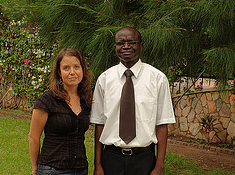 This is the first blog in a series about Action Aid’s work in Senegal.
This is the first blog in a series about Action Aid’s work in Senegal.
They are found on nearly every street corner in Western Africa—freshly roasted groundnuts are sold in small plastic bags or by the handful as a quick, protein-rich snack. These small nuts—which are technically legumes—have had a big influence on Africa. “Groundnuts,” says Moussa Faye, of Action Aid Senegal, “have made the wealth of this country.” But he explained that they’ve also created “poverty because of a crisis in groundnut sector after it was liberalized” by the government. One of Action Aid’s priorities in Senegal is to help groundnut farmers collectives find better ways to grow, process, and sell groundnuts and groundnut products.
When they first started working with groundnut farmers in 2004, according to Faye, there were no good quality seeds available. To solve this problem, Action Aid worked with farmers to develop a seed multiplication program, which Faye says, has been more successful than the government’s seed multiplication program. Why? Because Action Aid’s program involved farmers. They helped groundnut farmers build a stronger network through the national groundnut platform, giving farmers groups the opportunity to communicate with government officials. And Action Aid is helping link farmers to transporters and processors for groundnuts.
Action Aid is also helping correct misconceptions about groundnut production. He says “it’s not just a cash crop, but a food crop” because so many poor people depend on it as an important source of protein. It also serves as the main fodder for horses, cattle, and other livestock—the same animals who help plough groundnut fields. It’s “extremely strategic to have groundnuts that nourish both people and animals,” says Faye.
It’s also “not true that [groundnuts] destroy the soil,” according to Faye. Unsustainable farming and harvesting of groundnuts can lead to depletion of carbon in soils. But when done the right way, groundnut farming can be both profitable and environmentally sustainable. “It’s part of peoples’ cultures,” says Faye, and farmers have mastered innovative ways to grow it. Groundnuts are also well adapted to the hot and dry conditions of Senegal.
Farmers are also adding value to groundnuts by processing the crop themselves, instead of selling it to middlemen. In addition to grinding the nuts for butter and paste, farmers are also selling groundnut oil and oil cakes for animal feed. Farmers also developed ovens to burn the shells of the groundnuts for fuel for processing—the shells are very energy efficient, burning up to 12 hours. “Processing brings a lot of profits,” notes Faye and farmers with support from Action Aid are now building small processing plants in rural areas.

Bernard Pollack, an expert on local labor movements and communications, is currently traveling across the continent of Africa with his partner Danielle Nierenberg BorderJumpers.org, meeting with farmers, community organizers, labor activists/leaders, non-governmental organization (NGOs), the funding and donor communities, and others.
His travel writing from Africa has recently been featured in the Montreal Gazette, the NC News Observer, the Omaha World-Herald, and the Des Moines Register.
He holds an M.A. in Political Management from The George Washington University School of Political Management and a B.A. from the Elliot School of International Affairs at George Washington University.








